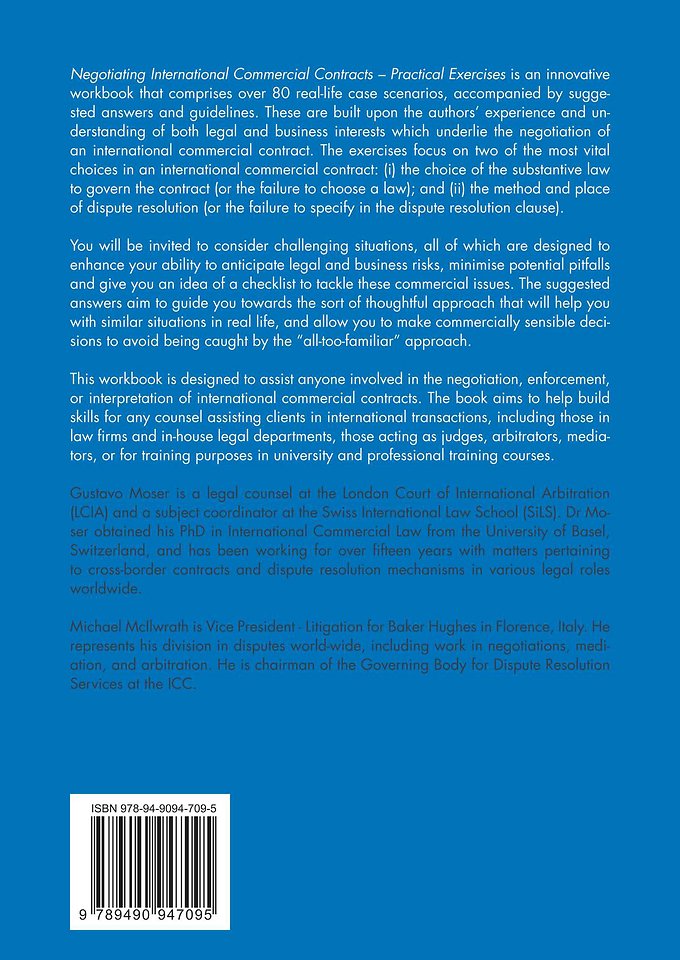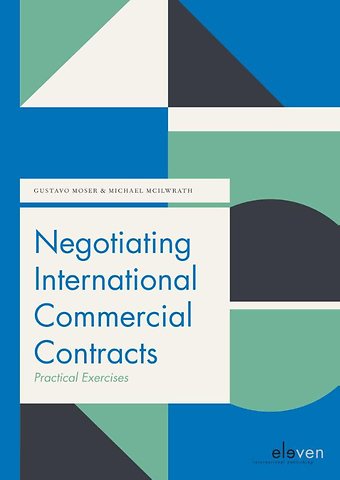Negotiating International Commercial Contracts: Practical Exercises
Samenvatting
Negotiating International Commercial Contracts – Practical Exercises is an innovative workbook that comprises over 80 real-life case scenarios, accompanied by suggested answers and guidelines. These are built upon the authors’ experience and understanding of both legal and business interests which underlie the negotiation of an international commercial contract. The exercises focus on two of the most vital choices in an international commercial contract: (i) the choice of the substantive law to govern the contract (or the failure to choose a law); and (ii) the method and place of dispute resolution (or the failure to specify in the dispute resolution clause).
You will be invited to consider challenging situations, all of which are designed to enhance your ability to anticipate legal and business risks, minimise potential pitfalls and give you an idea of a checklist to tackle these commercial issues. The suggested answers aim to guide you towards the sort of thoughtful approach that will help you with similar situations in real life, and allow you to make commercially sensible decisions to avoid being caught by the “all-too-familiar” approach.
This workbook is designed to assist anyone involved in the negotiation, enforcement, or interpretation of international commercial contracts. The book aims to help build skills for any counsel assisting clients in international transactions, including those in law firms and in-house legal departments, those acting as judges, arbitrators, mediators, or for training purposes in university and professional training courses.
Trefwoorden
Specificaties
Inhoudsopgave
1.1 Every International Commercial Negotiator’s Starting Point: Getting Comfortable with Unfamiliar Concepts 11
1.2 And Now the Choice of Law 14
Chapter 2 Negotiating Choice of Law Clauses 21
2.1 Introduction 21
2.2 Differences in How Courts and Arbitrators May Approach ‘Foreign Law’ 27
2.3 How the CISG Addresses Choice of Law Issues 29
Chapter 3 Negotiating Methods of Dispute Resolution 41
3.1 The Default Rule: Suing the Defendant in the Courts of Their Home Location 42
3.2 The Effect of the Hague Convention on the Choice of Courts 43
3.3 Why a Party May Prefer to Designate the Courts 43
3.4 Considerations When Proposing or Accepting Courts as the Forum 44
3.4.1 Alternatives to the Courts: Mediation and Arbitration Clauses 49
3.5 The Benefits of Neutrality, Efficiency and Enforceability of Mediation and Arbitration in International Commercial Contracts 50
3.5.1 Other Reasons Parties Specify Mediation in Their International Contracts 51
3.5.2 Other Reasons Parties Specify Arbitration in Their International Contracts 52
3.5.3 The Elements of an Arbitration Clause 52
3.5.4 The Agreement to Submit Disputes to Arbitration 53
3.6 Emergency or Interim Measures of Protection 54
3.7 The Seat or Place of Arbitration 55
3.8 Big Cities vs. Small Cities 56
3.9 Institutional vs. Ad Hoc Arbitration 56
3.10 Choosing among Different Arbitration Institutions 57
3.11 Arbitration vs. Courts: Different Ways of Approaching the Law 60
3.12 Arbitration vs. Courts: Offensive vs. Defensive Strategies 60
3.13 Agreements to Mediate before Arbitration or Court Litigation 62
3.14 Further Practice in Dispute Resolution 63
Chapter 4 Defective Choice of Law and Dispute Resolution Clauses – Prevention and Management of Potential Risks 67
Chapter 5 Putting It All Together 81
5.1 Group Negotiation and Discussion 81
5.2 How Choice of Law and Dispute Resolution Can Alter Certain Contractual Terms 85
5.3 Contractual Limitation of Liability and Choice of Law and Forum 87
Appendix Guidelines to the Exercises 93
About the Authors 121
Anderen die dit boek kochten, kochten ook
Net verschenen
Rubrieken
- aanbestedingsrecht
- aansprakelijkheids- en verzekeringsrecht
- accountancy
- algemeen juridisch
- arbeidsrecht
- bank- en effectenrecht
- bestuursrecht
- bouwrecht
- burgerlijk recht en procesrecht
- europees-internationaal recht
- fiscaal recht
- gezondheidsrecht
- insolventierecht
- intellectuele eigendom en ict-recht
- management
- mens en maatschappij
- milieu- en omgevingsrecht
- notarieel recht
- ondernemingsrecht
- pensioenrecht
- personen- en familierecht
- sociale zekerheidsrecht
- staatsrecht
- strafrecht en criminologie
- vastgoed- en huurrecht
- vreemdelingenrecht









